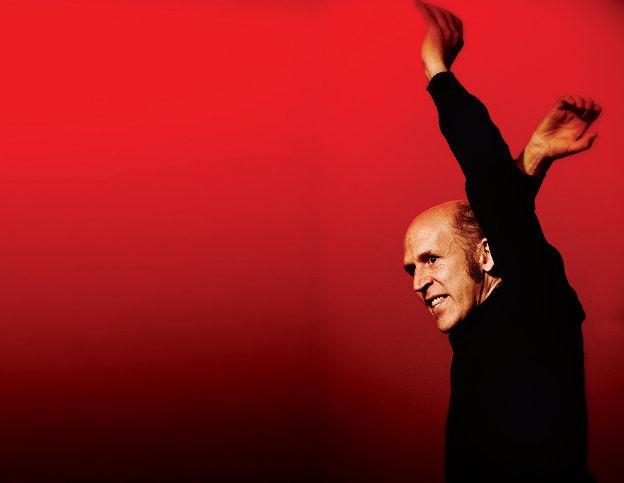
In recent years Cork company Gare St Lazare Players has brought the pared-down texts of writers like Samuel Beckett and Harold Pinter to the stage. Last year I was mesmerised by artistic director Conor Lovett’s performance of Beckett’s short story ‘The End’. This was my first experience of Lovett’s intimate style and it made me hungry for more. Here was a company whose minimalist realisation of a narrative text mirrored the aesthetic of the writer on its own terms. But while this made sense for Beckett’s minimalism, what would happen with a novel whose loquacity seems to resist the time-bound constraints of theatre performance? Fortunately, the company’s Moby Dick was as at ease with Herman Melville’s maximalism as it was unperturbed by Beckett’s restraint. An almost defiant gesture against its season of Beckett performances, Moby Dick dispelled any doubt that making Melville’s epic narrative truly intelligible for the stage was ever possible.
This is a company who cleave to the immediacy of the act of storytelling. Lovett is an intimate and ultra-focused companion, simultaneously reaching out to the audience and maintaining his control as storyteller. This accounts for the economy of Moby Dick’s staging: with the set comprising a desk, smaller desk and chair, neither Lovett’s and live musician Caoimhin Ó Raghallaigh’s funereal attire nor the almost imperceptible lighting altered the feeling of an empty space. For Gare St Lazare it seems that all design beyond muted lighting and monochromatic costumes is vulgarly extraneous, since it would obstruct the flow of language and music.
Both of the two performers entered the auditorium from its side doors as if they had stepped in on proceedings to which they had not been invited. Lovett took position standing in darkness behind Ó Raghallaigh who tentatively played his fiddle. The latter’s music – lying somewhere between abstract sound and a Celtic-maritime style – was all whispers and scrapes, rough-textured and mellifluous. Replete with harmonics and sweet dissonance, it was also other-worldly and introspective. Lovett then haltingly opened up an epic storytelling world as if he were dredging up long-dormant memories that, paradoxically, also remained vivid in spirit and mind. He started, perhaps inevitably, with the novel’s first line: ‘Call me Ishmael.’ But his rhythmic delivery gently convinced that this was a story being told as if for the first time.
The art of adapting novels for stage entails the painstaking art of excision. What should or can be left out while claiming fidelity to the text? Lovett’s realisation fastidiously marked the outline of the novel’s plot but retained ample sense of Melville’s digressive writing. A high-wire act that permitted access to interior worlds, I knew clearly the course of Ishmael’s journey in the geographical one. The course of the Pequod is really only half the story, for the novel frequently digresses from the plot to convey the awe-inspiring nature of the indomitable forces to which the characters are subject. Not all of these forces are natural or emanate from the leviathan. Seemingly coming out of nowhere, the following line struck me as an interpolation for a contemporary audience: ‘Grand contested Election for the Presidency of the United States / WHALING VOYAGE BY ONE ISHMAEL / BLOODY BATTLE IN AFGHANISTAN.’ But in fact, this is a quotation from the novel’s first chapter. The art of excision can sometimes entail the practice of artful selection.
As Lovett’s dynamism catapulted us into the swell of the sea, O’Raghallaigh’s creaking music suggested the ship’s ultimate vulnerability. In one scene, almost lost to his own gentle swaying, Lovett evoked the Pequod’s movement. Vivid enough without overstating the case, a similarly light physical touch was deployed to illustrate bodies coursing through and up and down the ship. Startlingly, Lovett’s vocal range jolted us within seconds and across decibels from an interior sensation to a storm-tossed Pequod. O’Raghallaigh’s melancholy strains had a rapt audience in Lovett as if the music was evoking Ishmael’s soul. Musician and performer rarely acknowledged each other’s presence, but when they did it was alarming, signalling that our interlocutor was submerged in remembering the past or that events were about to take a turn for the worse. Before the plot climax of the Pequod’s destruction by Moby-Dick, the performers simply changed positions. Having kept throughout to their own territories on stage, this was all we needed to know that the disaster was forthcoming.
Gare St Lazare Players’ technical verve for making narrative texts come alive through the fullest yet simplest of theatrical stagings retains the integrity of the source material. Through its shifting transitions and a restrained colour palette, the lighting design conveyed the mood-currents that come from turning over the book’s pages. But in the end we were in the hands of an astute live performer. As the lighting faded to black, Ishmael having acknowledged his eternal status as an orphan despite having survived the Pequod, it was impossible not to feel brushed by the chill wind of his existential isolation.

